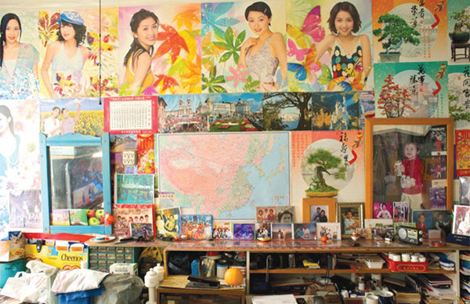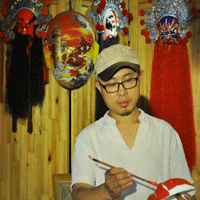Using the present to preserve the past
Updated: 2014-12-02 08:18
By Peng Yining(China Daily)
|
||||||||
The professional artist
In the county where I grew up, there were a lot of craftsmen. Many of them were farmers who traveled around the local villages looking for work during the slack season. When I was 16, a man came to our house to help us paint a wooden closet. It took him two weeks to finish the job. I watched him painting, sketching and drawing on the closet, and was impressed by his patience and the beauty of traditional Chinese painting.
He painted mountains, rivers and ancient beauties, the commonest themes in Chinese painting. But he painted so carefully that it was like he was pouring his emotions and life into the work.
It was snowing outside, but very warm in the house. I watched him working by the fireplace and was deeply moved. That man was an artist. I have been interested in the arts since I was a little boy, but that scene was definitely one of the most touching moments in my art career.
Sadly, people no longer make things themselves, and the beautiful techniques are disappearing. The reason I chose to draw and design masks for Shanxi Opera was that I didn't want the art form to die with the older generation.
I display my masks in my studio and visitors come to see them. I didn't trust the Internet before because information online is often incomplete and unverified, but now I realize that I can introduce my work to many more people online than in any other way.
The local historian
Although I was born and raised in a modern community in Zhanjiang city in Guangdong province, I didn't know much about my hometown's oldest neighborhood, which is poor, with narrow streets, and badly managed. Many homes don't even have a washroom, so people have to use the public toilets.
When I interviewed more than 50 people who lived in the neighborhood before 1945, I heard a lot of amazing stories about my hometown, including tales from 85-year-old Liang Jinming, who was twice threatened at gunpoint by Japanese and Kuomingtang soldiers when they tried to steal items from his grocery store.
He gave me a tour of the neighborhood and introduced me to other seniors who know the town's history. He said he wanted to tell me all the stories of his life. I felt his eagerness to save his memories of that period of history, and as a history student I have a responsibility to record them.
Recording the history of my hometown is a huge project, but we have fewer than 20 people, mostly students, and our resources are very limited. So we chose the Internet for promotional purposes, to raise money and to publish our work. We have interviewed more than 150 people and written 110 stories. Our work would never have received so much support and coverage if not for the attention we attracted through social networks.
- Cultural identity of ancient town endangered by tourism
- 5,000 villagers face relocation to save endangered red-crowned cranes
- Film festival promotes endangered mountain communities
- Monastery creates unique bond with endangered bharal
- Fighting officials' long-entrenched social networks
- Work issues hijack social networks
- Social networks close gap across Taiwan Straits

 World AIDS Day marked around the world
World AIDS Day marked around the world
 Chinatown told through photos of peoples' rooms
Chinatown told through photos of peoples' rooms
 Creative products by Palace Museum
Creative products by Palace Museum
 Group wedding before setting sail
Group wedding before setting sail
 Guangzhou zoo is home to five generations of koalas
Guangzhou zoo is home to five generations of koalas
 Top 10 favorite gift brands of rich Chinese men
Top 10 favorite gift brands of rich Chinese men
 UN climate change conference kicks off in Lima
UN climate change conference kicks off in Lima
 8 luxury cars and the image of their owners
8 luxury cars and the image of their owners
Most Viewed
Editor's Picks

|

|

|

|

|

|
Today's Top News
Using the present to preserve the past
Chinese investors helping build major US road link
Chinatown told through photos of peoples' rooms
Online sales boost Black Friday
More and more shoppers are going mobile
Chinese culture inspiration for student
Lima climate summit begins 2-week parlay
Tolerance ends, HK chief vows
US Weekly

|

|









